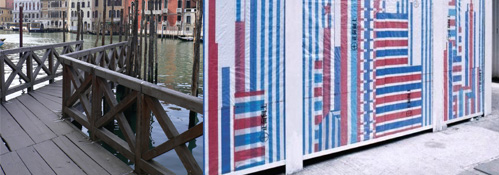Sabrina M.Y. Fung (F): Curator
Leung Ping-kwan (L) : writer, poet
| L: |
You are very keen to collaborate
on cross-media projects, including creative areas other than
painting, such as literature, film, music, etc. Which areas
interest you most? In your opinion, what facets of Hong Kong
culture do different artistic mediums reveal? |
| F: |
I am fascinated by all forms of artistic expression. But
my background is closer to visual arts, film and performance
and my collaborations are mostly concentrated in these areas.
As far as Hong Kong's visual artists are concerned, their works
tend to focus more on refined details and they contain a personal
dimension. |
| |
|
| L: |
So it is not the type of work that addresses
a grand "era", or historic events? |
| F: |
Exactly, one can say there are no such works. That is very
unlike the case for Mainland Chinese artists, whose works are
more focused on social, historic events and are often created
in a larger-than-life scale. Hong Kong artists emphasise detail,
and their works are somewhat more delicate. Of course, this
is a generalisation. Each artist works in his or her own unique
style, taking into consideration the nature and time frame of
a particular exhibition. And those who work in the comfort of
their own studios enjoy freedom of time and space and are thus
able to create excellent outstanding works. |
| |
|
| L: |
There are two types of problems with
Art in Hong Kong. One is inadequate expression in spite of good,
sound content. The other is a lack of depth. For instance, a
good film director has to draw on his or her life experiences
and self-cultivation to produce insightful works. Some visual
artists in Hong Kong are technically accomplished and perhaps
they can offer new inspiration. |
| F: |
But their concepts have yet to be developed. The main problem
is that many artists become "professional" right after
graduating from college and quickly find their way into gallery
and museum exhibitions without having the experience or time
to develop their works. |
| |
|
| L: |
Now there are plans to build more museums
and galleries. My biggest worry is that local artists lack the
vision, craftsmanship, cultivation and the genuine understanding
of their own culture that is necessary for them to be able to
rise to the occasion. |
| F: |
And it doesn't help that local commercial galleries tend to
show more traditional and decorative art works instead of supporting
the avant-garde art scene. They are influenced by the market,
after all. Hong Kong can support very few professional artists.
Most have to support themselves with a full-time job and create
works in their spare time. Totally different than professional
artists, they do not need to consider how they must compete
with other artists for survival. But if they want to advance
to the next level, constant self-reflection about their works
is essential. It is a type of ongoing cultivation. |
| |
|
| L: |
An artist has to work with his or her
heart and soul. |
| F: |
Absolutely. But for part time artists it's less a question
of survival than one of time. They pursue art as a personal
interest and it is therefore far from being a matter of life
and death. |
| |
|
| L: |
Do you think that local organisations
have failed to support the development of artists? There is
a lack of art coverage and reviews in the local media. Come
to think of it, art reviews, not only visual arts but also other
disciplines judge only on the basis of the number of works an
artist has created or where their works have been exhibited.
This leaves little room for artistic reflection, which can be
a real hindrance to artistic development. Young artists, especially
more notable names, receive adequate support and recognition
from society, but the public is still struggling to achieve
a consensus on how to promote and communicate the importance
of the arts. Young artists need support and challenges to grow
and develop, to establish contacts and to widen their horizons. |
| F: |
I agree that there is plenty of room for improvement. But
I am not sure that it is the responsibility of the organisations
to do this. Can society do something? |
| |
|
| L: |
Artists in Japan are backed by large
corporations and foreign funds. I don't think we should rely
solely on government support. The question is: are young and
up-coming artists given adequate means and opportunities to
develop their art and help them progress? |
| F: |
I think there are more opportunities now and space to grow
for active artists. However, it is a chicken and egg situation.
Artists will not create new works if there are no new exhibitions.
However, it is difficult to get financial support from the private
sector for exhibitions that are not commercial. |




